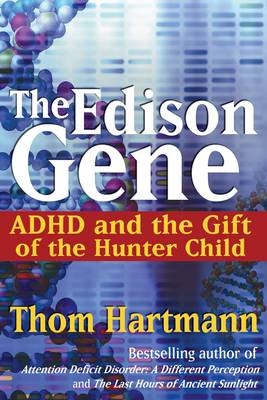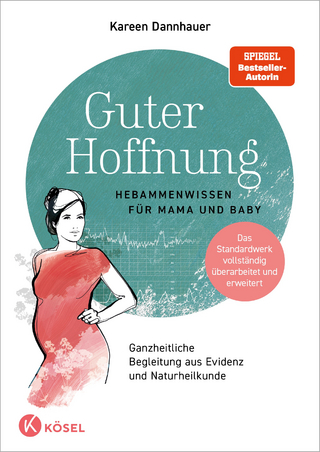
The Edison Gene
Park Street Press,U.S. (Verlag)
978-1-59477-049-4 (ISBN)
- Titel ist leider vergriffen;
keine Neuauflage - Artikel merken
Thomas Edison was expelled from school for behavior that today would label him as having Attention Deficit Hyperactivity Disorder (ADHD), but his mother understood how to salvage his self-esteem and prepare him for a lifetime of success. In The EdisonGeneThom Hartmann shows that the creativity, impulsiveness, and distractibility that are characteristic of ADHD are not signs of a disorder at all, but instead are components of a highly adaptive skill set utilized by our hunting and gathering ancestors. These characteristics have been critical to the survival and development of our modern civilization and will be vital as humanity faces new challenges in the future. Hartmann, creator of the “hunter versus farmer” theory of ADHD, examines the latest discoveries confirming the existence of an ADHD gene and the global catastrophe 40,000 years ago that triggered its development. Citing examples of significant innovators in our modern era, he argues that the children who possess the “Edison gene” have neurology that is wired to give them brilliant success as innovators, inventors, explorers, and entrepreneurs. He offers concrete strategies for helping Edison-gene children reach their full potential and shows that rather than being “problems,” such children are a vital gift to our society and the world.
Thom Hartmann is the award-winning, bestselling author of over a dozen books, including Attention Deficit Disorder: A Different Perception and The Last Hours of Ancient Sunlight. A former psychotherapist and founder of the Hunter School, a residential and day school for children with ADHD, he lives in central Vermont.
Foreword by Lucy Jo Palladino, Ph.D
Acknowledgments
Introduction: A New View for Our Children
Genetics and Differences • 1993: The Hunter Gene • Distractibility • Impulsivity • Risk-Taking • Where Have All the Hunters Gone? • Indigenous Hunters Today • The Agricultural Revolution • Our Society's Hunters • The Edison Gene • The Crisis-Survival Gene • Hunters Before the Holocene • Adapted to Adversity and Change
Part 1: The Past
1. The World of the Edison-Gene Child
The Ancient World • The Salt Pump • The Great Ice Age • Heated by the Great Conveyor Belt
2. The Dawn of Civilization
What Made Us Human? • The Bacteria That Took Over the World • The Human Bottleneck • Before the Bottleneck
3. Three Ways Humans Were Killed Off by Weather
Warming by the Sun • Vulcan's Hammer • Survivors: AIDS Chimps and the Black Plague • Creativity Saves the Day • ADHD and Creativity • The Beads: Clue to the First Edisons
Part 2: The Present
4. Anatomy of a Diagnosis
How Edison-Gene Children Are Different • Are They Disordered? • Anthropology Meets Psychology • From Hunters to Inventors
5. The Mystery of Novelty-Seeking Behavior
The "Novelty Gene" • The Novelty Gene and ADHD
6. Genes Move Around and Turn On and Off
The Genetics of Behavior • Turning on Genes • Codominant Genes • Turning on Edison Characteristics
7. Other Genes and Influences
Neurotransmitters and Personality Characteristics • The Reasons for Genetic Variations • Culture and Genes
8. Scientists Find the "Adaptive" Edison Gene
But Some Say It's a Disease • Is It a Disorder? • Novelty Seeking
9. The ADHD Gene and the Dawn of Human Civilization
The Time Machine • The News Hits the Streets • The Edison Gene and Democracy
10. Brain Development and the Edison-Gene Child
Sense of Self • A Process that Mirrors Evolution • The Reptilian Brain • The Limbic Brain • The "New" Brain • The Unique Prefrontal Brain • The Brain Develops After Birth, Too • The First Pruning of the Brain • The Impact of Stress • The Brain in the Birth Period • The Brain in the Toddler Period • The Brain in the Early Childhood Period • The Brain in the Teenage Period • The Brain in the Early Adult Years • Adult Memory of the Stages of Brain Development • Intuition versus Information • The Loss of Intuition • The Tragedy of Lost Potential • Invasion of the Lizard People? • Are We Stuck in a Loop? • Triggering Events • Raising Fully Human Children • Schools May Be the Key • School as Torture • Condemnation • School as Work • Comorbidities • Applying Comorbidities to Edison-Gene Children • Breaking the Loop • Offering a New Story
11. The Edison Gene, Drugs, Exercise, and Nutrition
Nutritional Deficiencies Are Rampant • Environmental Toxins • Nutriceuticals • Yerba Maté: Nature's Ritalin • Drugs for Edison-Gene Children • Medications Bite Back • Burning Out Brain Cells? • Do Drugs Help Over the Long Term? • The Loss of Play • EEG Neurofeedback • Exercise: The Optimal "Treatment"?
12. Providing Discipline and Structure for the Edison-Gene Child
Nurturing the Hunters • Reward/Punishment versus Inclusion/Interdependence • Separating Person from Behavior • Break the Pattern with a Positive Message • Watch for Islands of Success • The Importance of Mastery • Turn Off the Television
13. Alfred Adler's Principles for Raising Children
Promote Mutual Respect • Encourage • Foster Security • Avoid Reward and Punishment • Use Natural and Logical Consequences • Act Instead of Talk in Conflict Situations • Use Withdrawal as a Counteraction • Withdraw from the Provocation, Not from the Child • Don't Interfere in Children's Fights • Fighting Requires Cooperation • Take Time to Teach Essential Skills and Habits • Never Do for a Child What He Can Do for Himself • Don't Overprotect • Avoid Being Overly Responsible • Distinguish Between Positive and Negative Attention • Understand the Child's Goal • A Habit Is Maintained If It Achieves Its Purpose • Minimize Mistakes • Try a Family Council and Have Fun Together • The Edison-Gene Family
14. Educating the Edison-Gene Child
Learned Helplessness • Reframing Identity = Success in Learning • Government Studies Pronounce on Medication • They Ignored the Environment • The Study Proved Ritalin Doesn't Improve Learning • But It Makes the Teachers Happy • Lighting a Fire for Learning • Education and Testing Corporations • How Modern Education Came About • German Schools Come to America • American Education and the Catholic Problem • Backlash Against the Authoritarian Model of Public Education • Maria Montessori • Rudolf Steiner • Free and Alternative Schools • Homeschooling and Internet Schooling • But What About Socialization? • Why Homeschooling Works for Edison-Gene Children • The Edison Gene through the College Years • Find a Mentor or a Coach
15. Edison-Gene Girls and Women
Be a Good Girl • Cinderella in a Hostile World • Cultural Barriers • Cultural Programming and Expectations • Healing the Wounds
16. Spirituality and the Edison-Gene Child
Edison-Gene Mystics • The Hunter's Reality • The World of the Hunter's Dreams • Dreaming with the Natives • Learning to Know • Understanding the Real World • Wild People and Tame People • The Loss of True Wisdom • When Access to Personal Spirituality is Lost
Part 3: The Future
17. How Edison-Gene Children May Change the World
Glimmers of How Culture Works • What Causes Culture? • The Biology of Culture • Primal Human Cultures • Cultural and Genetic Selection
18. Is Human Evolution Finally Over?
As Good As It Gets • We're Going Downhill • It's the Fault of Those People with ADHD! • Are We Standing Still? • Distant Bottleneck Events
19. One Generation to Save the World
Climate Flip-Flops to the Next Ice Age • A Global-Warming Bottleneck
Afterword: Yesterday's Child by Janie Bowman
Notes
Index
| Verlagsort | Rochester |
|---|---|
| Sprache | englisch |
| Maße | 152 x 229 mm |
| Gewicht | 355 g |
| Themenwelt | Sachbuch/Ratgeber ► Gesundheit / Leben / Psychologie ► Schwangerschaft / Geburt |
| ISBN-10 | 1-59477-049-2 / 1594770492 |
| ISBN-13 | 978-1-59477-049-4 / 9781594770494 |
| Zustand | Neuware |
| Haben Sie eine Frage zum Produkt? |
aus dem Bereich


